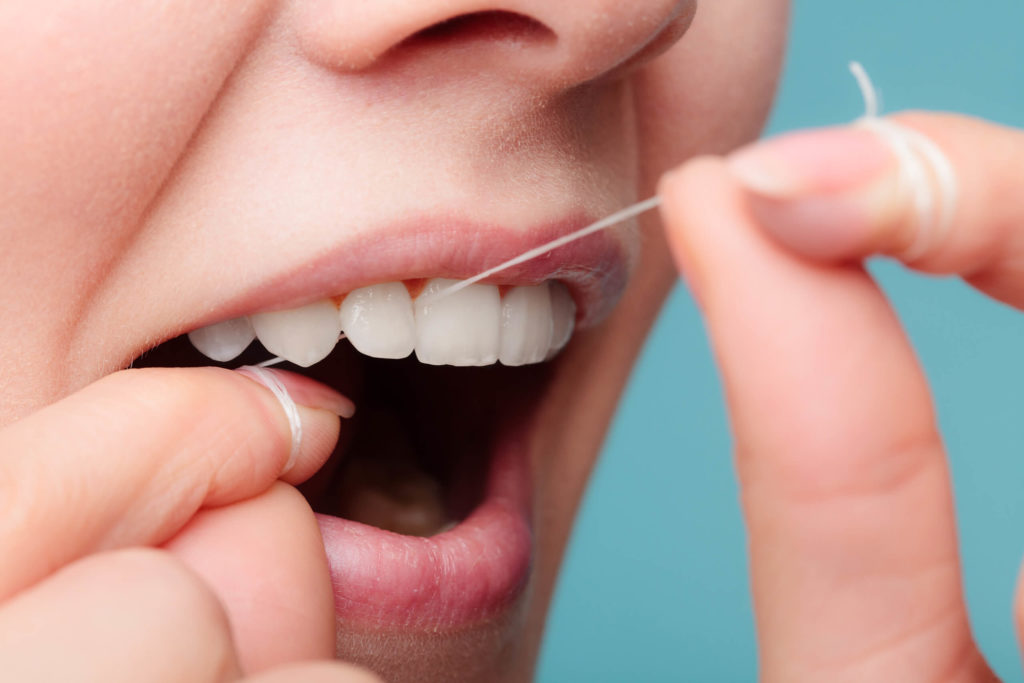
When it comes to your oral hygiene, flossing should always be part of your daily routine. Brushing your teeth is essential, but it doesn’t effectively clean your teeth on its own. Flossing is important for many reasons, primarily because it can clean between your teeth in a way that brushing cannot do alone. Here are some of the many benefits of flossing and why you should floss every day.
1. Gets rid of plaque buildup
Plaque is a colorless, sticky film that collects around your teeth and gum line. Plaque forms when bacteria in your mouth mix with starchy or sugary foods and drinks. It is the number one reason why brushing and flossing are essential to your oral health. If left to build on your teeth, the bacteria in plaque can release acids that attack your tooth enamel and lead to cavities.
Flossing your teeth every day can help to remove plaque that’s built up around and in between your teeth by reaching places that your toothbrush may miss.
2. Removes food from between your teeth
When you brush your teeth, you may miss small particles of food that are stuck between your teeth. This can cause discomfort, as well as increase bacteria in your mouth. Food particles can also contribute to bad breath.
Flossing is important to keeping your teeth healthy by removing food that could have been missed while brushing.
3. Reduces risk of cavities
Both plaque and food particles between your teeth can eventually lead to tooth decay. When your teeth begin to decay due to improper care, your risk of cavities is increased. When tooth decay results in a cavity, a tiny opening or hole forms in the hard surface of your teeth. Cavities can be uncomfortable or even painful, and they always require treatment from your dentist.
To prevent cavities and tooth decay, flossing between your teeth at least once a day is an essential addition to your regular brushing habits.

4. Helps prevent gum disease
Gum disease can be very serious, so taking measures to prevent it is important for your overall health. Gingivitis is the early stage of gum disease, and one of the first signs of gingivitis is inflammation around your gums. Your gums may also bleed when you brush or floss your teeth.
To reduce your risk of gum disease, don’t skip out on brushing and flossing your teeth every day. It is also recommended that you get professional cleanings by your dentist every 6 months to keep your gums healthy.
5. Improves Breath
Plaque buildup and food particles that are stuck between your teeth can both contribute to bad breath. When food gets trapped between your teeth, it slowly starts to decay. This can cause your breath to smell bad. Gum disease caused by plaque buildup can also contribute to bad breath.
Flossing can help to remove both plaque and food, which can effectively prevent these causes of bad breath.
Not only is it important to floss every day, but it is also important to make sure that you are flossing properly. You can find a variety of dental tools designed to make flossing easier, so you can choose one that works best for you. For example:
- Traditional String Floss: string floss can come waxed or unwaxed, and some even have subtle flavorings such as mint. It comes in a long spool so you can unroll the amount you need each time. Simply loop the floss around your fingers and floss each tooth.
- Dental Picks: dental picks are a convenient option for flossing that you may find easier than using string floss. Dental picks have a small section of floss pre-attached to a disposable plastic handle, so they are ready to use and easy to hold.
- Water Flossers: a water flosser is a handheld device with a small brush-like tip. The tool is charged and then filled with water to spray a thin stream of water to clean between the teeth. They do have a bit of a learning curve, but they can be very effective.
Taking care of your teeth is important not just for your oral hygiene, but for your overall health as well. Brushing and flossing regularly as well as scheduling visits with your dentist are all ways to make sure your smile is healthy. To book an appointment at Fisher Point Dental, contact us through our website or call our office.
